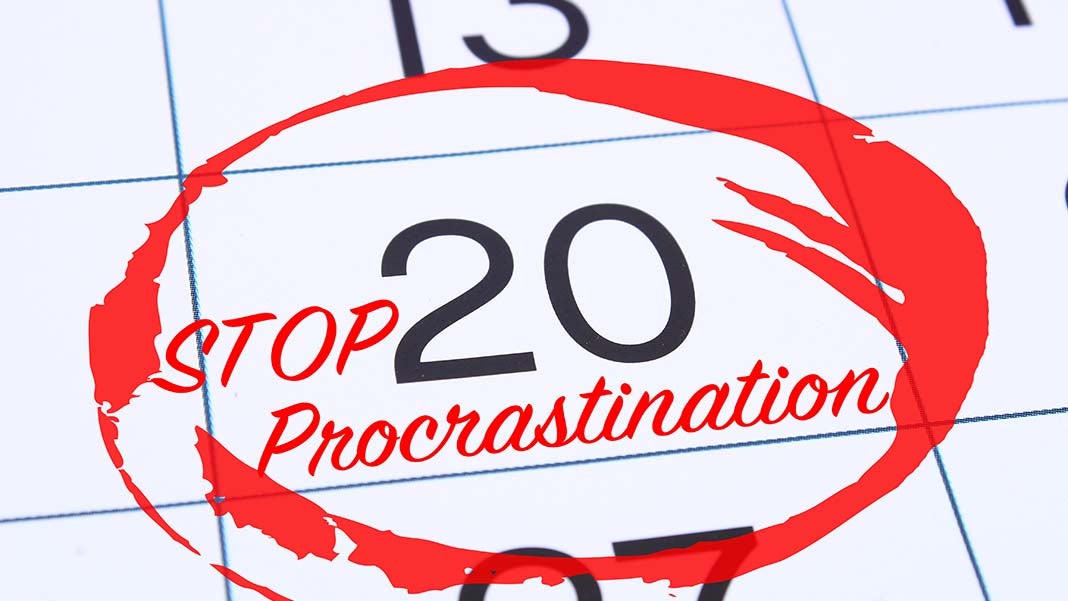How to Stop Procrastinating: 5 Ways to Regain Control of Your Business and Your Life
By: Alan Weiss

Procrastination is the act of delaying something for no good reason. In Latin, procrastinare means “to put off until tomorrow.” In Greek, akrasia means doing something against our better judgment.
Procrastinating, no matter how we tend to rationalize it by saying “this isn’t the best time” or “there are other priorities” or “the moon is not in the shadow of Aries,” is self-inflicted misery. It’s misery because we’re aware of it, we know we’re doing it, and we know we’ll be criticized for engaging in it.
We fear moving, and we fear not moving. How’s that for a stellar “Catch-22”?
We rationally know it’s irrational to procrastinate. Yet we’re addicted as if we’ve opened a box of chocolate-covered pretzels.
The Feelings—and Fears—Behind the Spiral
Procrastination isn’t an illness or a sin. It’s a result of poor self-worth and low esteem. We need to conquer these feelings to overcome the fears that create procrastination. We need to focus on our attitude, rather than the perceived unpleasantness or gargantuan nature of the task at hand.
Our self-doubt and insecurities promote the irrational belief that what we do can’t possibly be good enough, and that critique is inevitable. Thus, we take a beating for not moving rather than moving into perceived deep trouble.
And when we do, we start the spiral of blaming ourselves more, lowering our esteem even further, and delaying even longer. Procrastination provides us with immediate gratification—and temporary relief—by escaping a perceived negative task or responsibility. We end up procrastinating repeatedly to gain this short-term benefit again, and again, and again. In effect, procrastination becomes a way of life.
This way of life can produce great stress and consequent deleterious implications for our health, potential, and reputation. The momentary gratification we get eventually gives way to long-term discouragement (or even depression).
So, we procrastinate more. Procrastination is like a drug addiction: We feel terrible once the drug wears off, so we take more of the drug to feel better, and we end up feeling even worse.
Presentism and Procrastination
What else contributes to procrastination? Presentism. There’s a great deal of “presentism” today, whereby we use our current values and beliefs to critique and even alter the past. We tear down statues, rename schools, and stop honoring certain traditional heroes.
Presentism, however, also relates to focusing exclusively on present, short-term needs over long-term needs. We identify, of course, with who we are today, not who we’ll be in the future, which makes it easy and natural to focus on the present first. When you add in stress, our focus on the present amplifies, and we don’t make long-term decisions at all (or at least not very well or easily).
Even though we rationally recognize that procrastinating will create more stress, we’re more focused on removing the fear in the present. This fear is quite strong, strong enough to affect leaders in daily decision-making on an ongoing basis. We can’t just tell ourselves, as we would hear in some Bob Newhart routine, to just “Stop it!” Fear has already taken hold.
5 Ways to Regain Control
Once we realize that we’re talking about emotions and not the actual tasks at hand, we can reclaim some of our control. We need to attack the immediate gratification of procrastination with alternative, healthier gratifications.
Here are some steps to take:
Recognize it. Recognize your procrastination and forgive yourself as you would for an error, a mistake, or an unkind word.
Build your self-esteem daily. Build your self-esteem by focusing on your daily accomplishments and contributions. I’ve achieved great results with people by simply teaching them to take a minute in the morning and a minute in the evening to review the positive things they’ve accomplished and plan to achieve.
Go public. Help others hold you accountable for deadlines, results, and commitments. This will help you realize your procrastination will be letting down others who are important to you.
Break it apart. On a more granular level, understand the components of what you want to accomplish, not merely the totality. Launching a new product is daunting, but finding a project manager, selecting a trial market, and agreeing on a price might be much more comfortable as component actions. Keep breaking things apart until procrastination would seem silly.
Block your escape routes. Remove (or have someone remove) what I call “procrastination alleys.” These are the escape routes you currently use. Don’t try to work on something with your guitar sitting in the corner. Turn off your computer screen and smartphone. Don’t listen to music. Move to a conference room without windows and get out of your office.
Procrastination is both a manifestation of fear and fear-induced. It’s a double-edged sword, and it’s critical to blunt it. We mistake it for the natural outcome of the intellectually curious, or assign it (as we do too many faults today) to attention deficit disorder, or we call it “human nature.” But it’s far more insidious when it’s not faced candidly.
Procrastination is drenched in fear and thrives in fear—and we need to overcome that to be fearless leaders.
3894 Views











